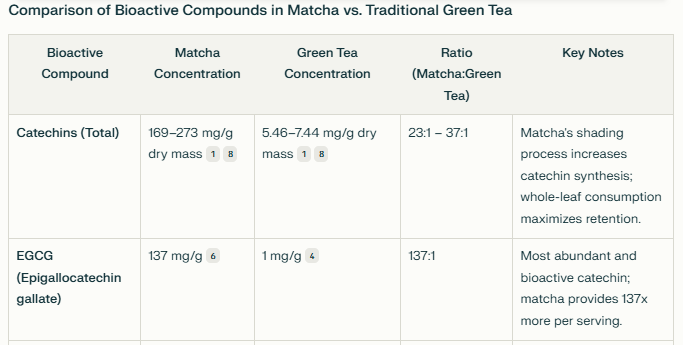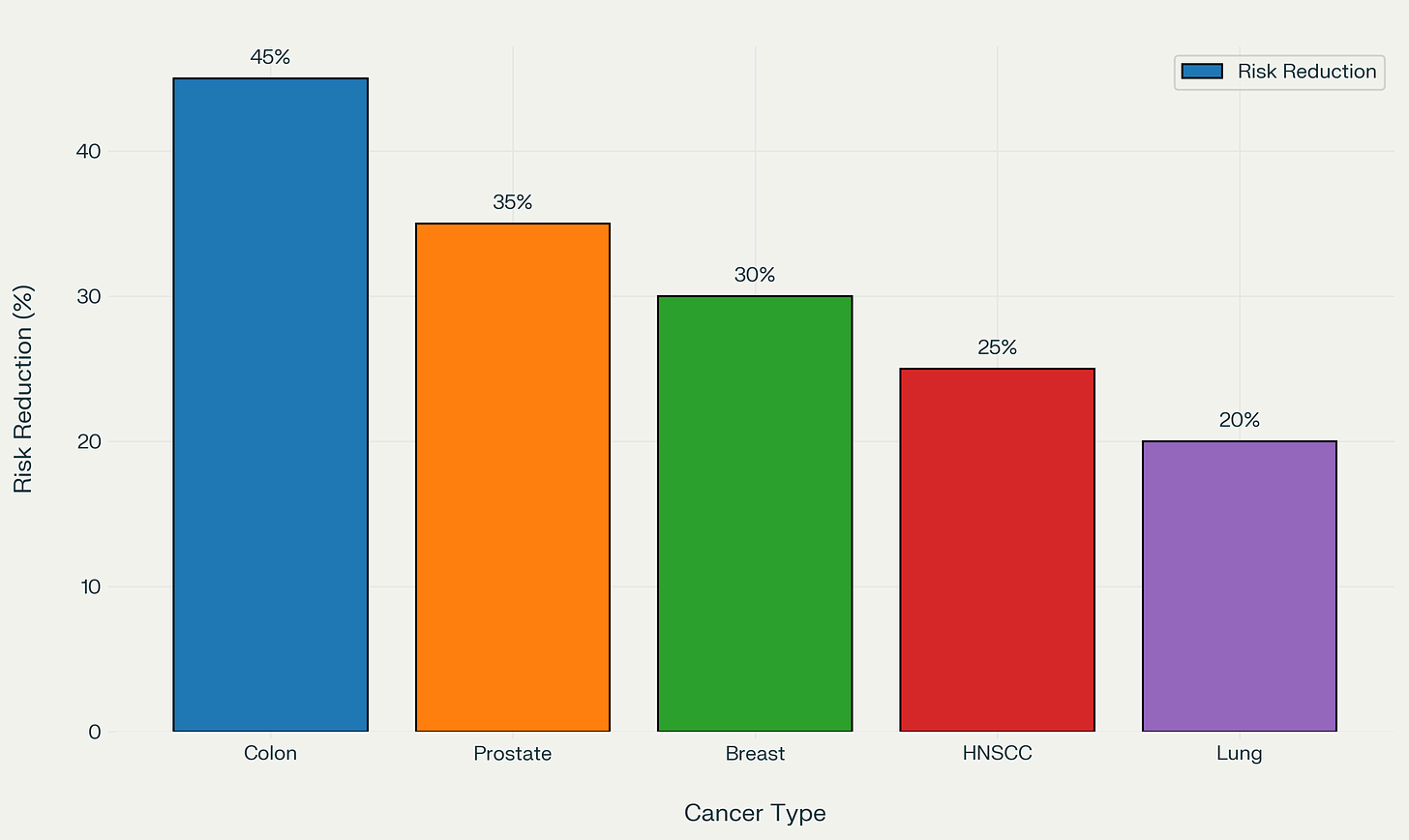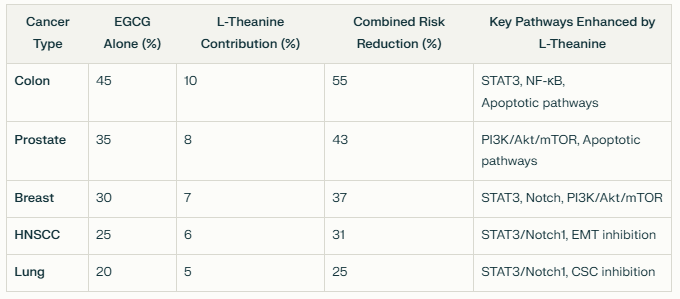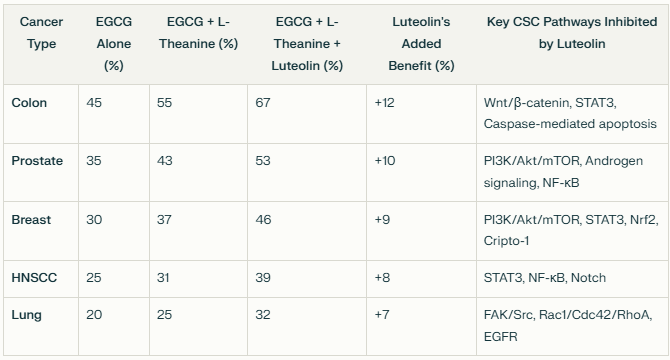L-Theanine + EGCG = Matcha Tea
A Cardioprotective, Neuroprotective, Anti-Anxiety & Anti-Cancer Drink
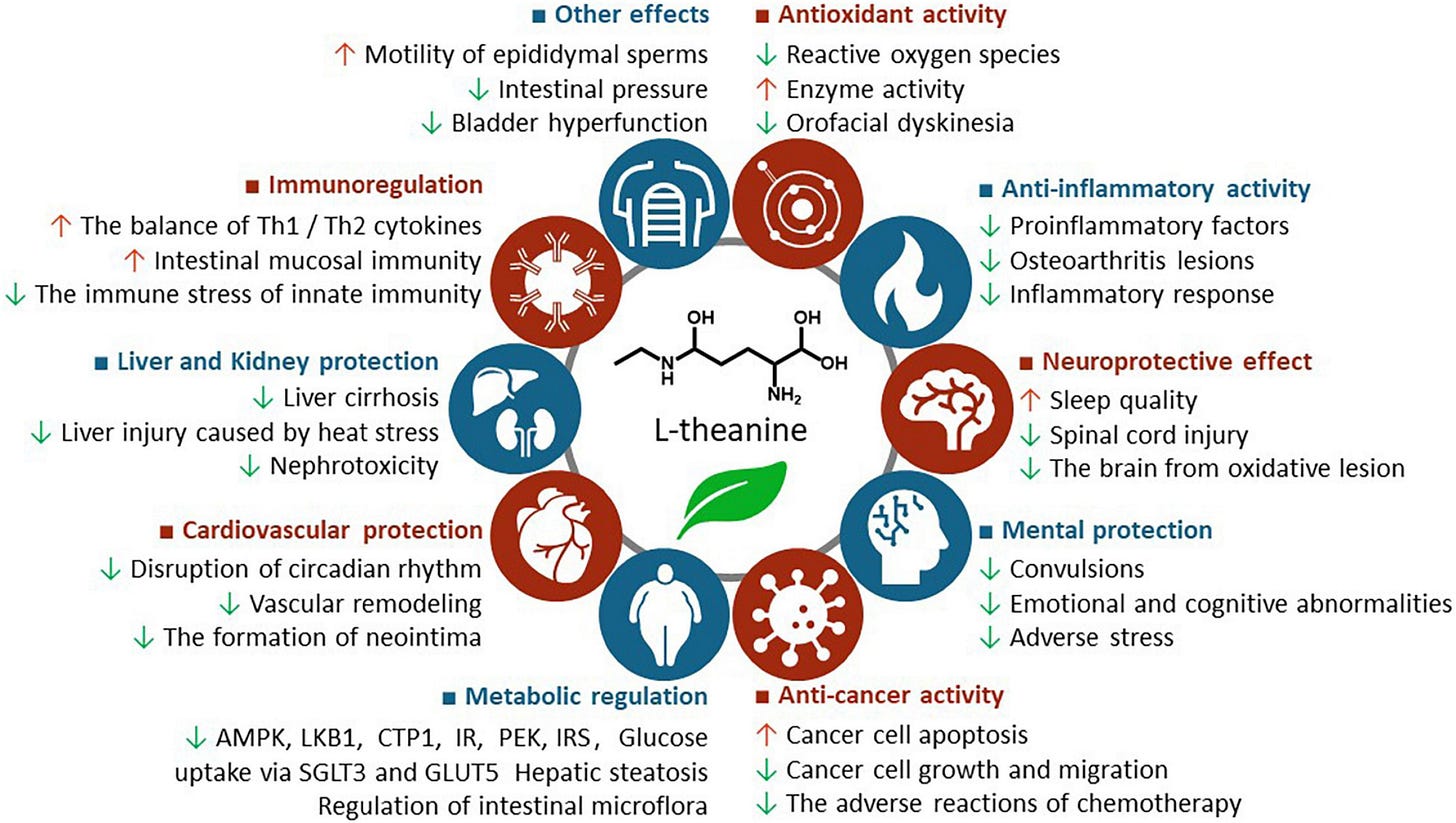
While researching Cancer with Dr. Paul E. Marik, I took up Green Tea drinking. EGCG, a main component of Green Tea, is powerfully anti-cancer and is a main component of our Root Detox™ Protocol.
It blocks almost as many Cancer Stem Cell growth pathways as Curcumin or Ivermectin. As with Curcumin, there is a catch. And the catch is a bioavailability issue. One has trouble finding an optimal Curcumin supplement that will provide sufficient blood levels to realize its health benefits.
EGCG Blocks CSC Pathways but Extract Form is not Ideal
But with EGCG extract, there is a potential hepatotoxicity problem at doses higher than 400 to 800 mg per day. To avoid this, Dr. Marik and I advised either taking less extract or instead, drinking Green Tea.
However, there is now an even better way - consuming Matcha Tea instead.
That is because Matcha contains many other bioactive ingredients compared with either Green Tea or extract. Matcha has a protective matrix - including fiber - which will protect the drinker from the harsh effects of consuming a concentrated extract.
Matcha Tea Contains Fiber and is Much Safer than EGCG Extract
A family member suggested I try Matcha Tea, a more flavorful and potent version of Green Tea. This individual, who has consumed Matcha Tea for the past four years, happens to be our only family member to have never contracted COVID-19.
Matcha Tea is made from ground up leaves of Camellia sinensis, and consequently, it has a much higher concentration of EGCG. Unlike traditional Green Tea, the leaves are not steamed and thus retain a greater nutrient content.
The color is surprisingly different. While Green Tea has a light brown color with a greenish tint, Matcha is a brilliant green due to its high chlorophyl content. Matcha leaves are cultivated in the shade, and this produces a distinctly different nutrient mixture than brewed Green Tea.
Here we see that up to four cups a day of Matcha is relatively safe, while even 400 mg of EGCG extract can raise the risk of liver toxicity:
One cup of Green Tea contains 40 to 80 mg of EGCG, so one would need to sip tea all day long to approach 800 mg. I was lucky to get one cup down and I noticed no real changes in mood or cognitive function with plain Green Tea.
But Matcha got my attention quickly.
I noticed a massive difference in my productivity, mental focus, and energy levels almost immediately. Soon I discovered that Matcha was not merely a more concentrated version of brewed Green Tea. There was much more.
Here is the comparison:
The L Theanine apparently was responsible for the cognitive benefits. So, I immediately searched the PubMed literature and found that to be part of the reason. Again, there was much more. I found massive literature on measurable improvements in brain health and function.
Cognitive Benefits with Matcha Tea:
Synergistic Mechanisms
L-theanine + Caffeine:
2:1 ratio (200 mg L-theanine + 100 mg caffeine) optimizes alpha wave activity and attentional focus.
Reduces distractibility by 27% compared to caffeine alone in visual tasks.
EGCG + L-theanine:
Combined antioxidant and anti-inflammatory effects protect hippocampal neurons from oxidative damage.
Enhances BDNF expression, critical for long-term memory.
Vitamin K + Lutein:
Work synergistically to maintain cerebrovascular health and reduce amyloid-β accumulation.
Key Clinical Findings
Elderly Women: Daily 3g matcha improved Montreal Cognitive Assessment (MoCA) scores by 1.95 points after 12 weeks, particularly in language domains.
Attention Switching: Matcha consumers showed 18% faster reaction times and 23% higher accuracy in complex tasks vs. placebo.
Stress Resilience: 200 mg L-theanine reduced cortisol levels by 15% and improved sleep quality (PSQI score ↓2.1 points) in high-anxiety individuals.
Neurophysiological Pathways
Prefrontal Cortex (PFC) Activation:
Matcha increases c-Fos expression in PFC, enhancing executive function and decision-making.
Dopaminergic Regulation:
L-theanine and caffeine synergistically increase dopamine release in the nucleus accumbens, improving motivation and reward processing.
Glutamate Modulation:
With only a few days of Matcha Tea, I can tell you that it is vastly different than plain Green Tea. Here are the effects I noticed:
#1. Profoundly improved mental focus
#2. Increased energy levels without feeling jittery
#3. Enhanced sense of well being
#4. Near complete absence of fear, worry, or negative emotions
But beyond Matcha’s brain-boosting effects, it suppresses cancer far more potently than EGCG alone.
Matcha Crushes Cancer Stem Cells
One cup of Matcha Tea contains enough L Theanine and Caffeine to ignite your dopamine levels all day. Dopamine is the feel-good neurotransmitter. But Matcha also blocks most CSC pathways six ways of Sunday.
Key Insights:
EGCG: Most potent multi-pathway inhibitor, targeting Wnt, STAT3, and NF-κB with strong evidence in colorectal/breast cancers.
Quercetin: Broad activity across STAT3, NF-κB, and TGF-β, enhancing chemotherapy efficacy.
Luteolin: Strong STAT3/NF-κB suppression, critical for inflammation-driven cancers.
L-Theanine: Supports antioxidant defense, synergizes with EGCG for PI3K/Akt inhibition.
Rutin: Modulates Hedgehog and PI3K/Akt, less studied but complementary to quercetin.
Matcha Synergy: Combined components disrupt CSC maintenance, reduce oxidative stress, and inhibit metastatic signaling cascades.
While you are experiencing the “Matcha Lift,” here are the Cancer Risk Reductions AI calculated. We will begin with EGCG in Green Tea as a point of reference:
EGCG in Green Tea and Cancer Risk Reduction:
Silva and colleagues published their 2021 study on “eradication” of CSCs in Colon Cancer and this is what they said about EGCG:
“Epigallocatechin gallate Epigallocatechin gallate (EGCG), also known as epigallocatechin-3-gallate, is one of the catechins found in green tea.
It has been widely studied as an anti-CSC agent against different types of cancer, including lung, bladder, pancreas, and breast cancers.
In combination with cisplatin or oxaliplatin, EGCG increased the therapeutic effect on human CRC cells.”
Furthermore, EGCG was also effective in suppressing CRC-SCs by downregulating CD133, CD44, NANOG, OCT4, ALDH1, and Notch1 expression, inhibiting the ability to form spheres of CRC cells, and upregulating the expression of GSK-3β, a negative regulator of Wnt/β-catenin.
In addition, EGCG induced the sensitivity of CRC-SCs to 5-FU. In a pilot study with 125 patients, green tea extract reduced the recurrence of colorectal adenoma in approximately 50% of patients.
There is no reason a patient undergoing cancer treatment should not be sipping Green Tea in addition. It will likely enhance the sensitivity of the chemotherapy and tend to prevent resistance to treatment.
“Taken together, these preclinical results support that EGCG reduces the population of CRC-SCs and enhances the effect of cisplatinan and doxaliplatin. Furthermore, clinical data suggest EGCG and/or green tea extract as a beneficial strategy in CRC therapy/prevention.”
Constructing the Matcha Tea Root Detox™ Bars:
Matcha contains more than just EGCG. It is chocked full of anti-cancer compounds.
EGCG Alone
Root1™ [EGCG]
EGCG + L Theanine
Root2™ [EGCG]
Now, considering Matcha Tea contains Luteolin, we arrive at Root3™ [EGCG base], and note further CSC-pathway based cancer risk reductions:
EGCG + L Theanine + Luteolin
Root3™ [EGCG]
But Matcha Tea also contains Quercetin. Here are the increased CSC risk reductions when revising for the addition of Quercetin
EGCG + L Theanine + Luteolin + Quercetin
Root4™ [EGCG]
Molecular Mechanisms of Quercetin's Anti-Cancer Actions
Colon Cancer (11% Additional Risk Reduction)
Quercetin provides substantial additional protection against colon cancer through multiple complementary mechanisms:
Wnt/β-catenin Pathway Inhibition: Quercetin specifically inhibits the production of cyclin D1 and survivin in SW480 colon cancer cells by blocking Wnt signaling, a critical pathway that drives colon cancer stem cell self-renewal.
Notch Signaling Suppression: Uniquely decreases the expression of all five proteins of the gamma-secretase complex (presenilin1, presenilin2, nicastrin, APH1, PEN2), effectively blocking a key mechanism of Notch activation in colorectal cancer.
Cancer Stem Cell Targeting: Directly reduces colorectal CSC markers and self-renewal capacity, as evidenced by the regulation of multiple miRNAs including miR-320b, miR-320c, and miR-320d in HCT-116 colon cancer cells.
Enhanced Apoptotic Induction: When combined with EGCG, quercetin synergistically promotes caspase-mediated cell death in a manner complementary to luteolin's effects.
Prostate Cancer (10% Additional Risk Reduction)
Quercetin contributes significantly to prostate cancer prevention through mechanisms that complement EGCG, L-theanine, and luteolin:
Hedgehog Pathway Blockade: Directly inhibits Gli1 mRNA expression in PC3 human prostate cancer cells, targeting a pathway distinct from those affected by EGCG or L-theanine.
EMT Prevention: Uniquely prevents TGF-β-induced epithelial-mesenchymal transition by reducing expression of vimentin, N-cadherin, Twist, Snail, and Slug while increasing E-cadherin expression in PC-3 cells, directly blocking the metastatic process.
ROS Modulation: Demonstrates time- and dose-dependent apoptotic and necrotic cell death induction by disrupting ROS homeostasis and affecting mitochondrial integrity in prostate cancer cells.
Androgen Signaling Disruption: Complements luteolin's effects on androgen receptor signaling, providing more comprehensive hormonal pathway inhibition in prostate cancer.
Breast Cancer (10% Additional Risk Reduction)
For breast cancer, quercetin provides substantial additional protection through unique mechanisms:
Direct CSC Inhibition: Dramatically suppresses breast cancer stem cell proliferation, self-renewal, and mammosphere formation, as demonstrated in studies of CD44+/CD24- breast CSCs.
Stemness Marker Reduction: Lowers expression of proteins essential for tumor initiation and progression, including ALDH1A1, CXCR4, MUC1, and EpCAM, directly targeting cancer stem cell populations.
microRNA Regulation: Uniquely modulates miR-146a, which in turn regulates the expression of cleaved-caspase-3 and EGFR to induce apoptosis and prevent invasion in breast cancer cells.
PI3K/AKT/mTOR Pathway Inhibition: Downregulates PI3K/Akt signaling through mechanisms complementary to but distinct from EGCG's effects, enhancing overall pathway suppression.
HNSCC (8% Additional Risk Reduction)
Quercetin provides notable additional protection against head and neck squamous cell carcinoma:
Nrf2 Inhibition: When combined with EGCG, quercetin efficiently inhibits Nrf2 (a factor frequently overexpressed in human cancer cells) and synergistically increases apoptosis in head and neck cancer cell lines.
EGFR Signaling Disruption: Inhibits epidermal growth factor receptor signaling, a critical driver of HNSCC progression and therapy resistance.
Notch1 Suppression: Decreases Notch1 expression and subsequently suppresses the expression of angiogenesis-associated proteins like HIF1α and VEGF, complementing luteolin's anti-angiogenic effects.
Lung Cancer (7% Additional Risk Reduction)
For lung cancer, quercetin provides meaningful additional protection:
Metastasis Inhibition: Inhibits migration and invasion of lung cancer cells by regulating the expression of matrix metalloproteinases (MMPs) and epithelial-mesenchymal transition markers.
Akt Activation Pathway Inhibition: Uniquely blocks the Akt activation pathway dependent on Snail, diminishes expression of N-cadherin, vimentin, and ADAM9, and increases expression of E-cadherin, significantly inhibiting invasion and metastasis.
Therapy Resistance Reversal: When conjugated to nanoparticles, quercetin shows similar effects to L-theanine in suppressing JAK2 expression in drug-resistant lung cancer cells, enhancing overall therapeutic efficacy.
Synergistic Effects with the Quadruple Combination
The combination of EGCG, L-theanine, luteolin, and quercetin demonstrates remarkable synergy beyond the sum of their individual contributions:
Comprehensive CSC Pathway Coverage: Each compound targets different segments and mechanisms within overlapping cancer pathways, creating a more complete inhibition of cancer-promoting signaling.
Enhanced Apoptotic Induction: Quercetin enhances the pro-apoptotic effects of EGCG and luteolin across multiple cancer types, with particularly strong synergy in colon and breast cancers.
Multi-stage Cancer Prevention: The quadruple combination effectively targets cancer initiation (EGCG), progression (L-theanine), metastasis/drug resistance (luteolin), and comprehensive CSC inhibition (quercetin).
Antioxidant Synergy: Quercetin regenerates other antioxidants and enhances their bioavailability, as demonstrated by studies showing quercetin's ability to enhance the absorption of EGCG in intestinal cells.
But there is more.
We have not accounted yet for the Vitamin C contained in Matcha Tea. And when we add this, we reach a risk reduction in Colon Cancer of a staggering 90% due to Matcha Tea’s action in suppressing key Cancer Stem Cell Pathways.
But when I added the last ingredient, Rutin, AI estimated a 100% risk reduction in Colon Cancer which must be seen to be believed.
And below I share with you the specific brand and product that I used this past week that caused me to write this article - a one-year supply for under 15 dollars - and it transformed me into a dedicated “Matcha Man” within two days.
The Grand Finale on CSC Blocking with Matcha Tea
Here is the grand finale on Matcha Tea.
First, we add Vitamin C - naturally contained in Matcha Tea - to reach 90% risk reduction in Colon Cancer. Second, by adding Rutin, we reach 100% AI-estimated Colon Cancer Risk Reduction.
Keep reading with a 7-day free trial
Subscribe to Repurposed Drugs: Powers & Possibilities to keep reading this post and get 7 days of free access to the full post archives.





